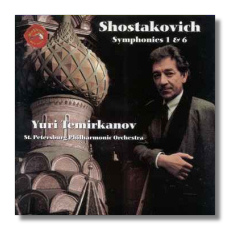
The Internet's Premier Classical Music Source
Related Links
- Shostakovich Reviews
- Latest Reviews
- More Reviews
-
By Composer
-
Collections
DVD & Blu-ray
Books
Concert Reviews
Articles/Interviews
Software
Audio
Search Amazon
Recommended Links
Site News
 CD Review
CD Review
Dmitri Shostakovich

Symphonies
- Symphony #1 in F minor, Op. 10 (1925)
- Symphony #6 in B minor, Op. 54 (1939)
- Overture "Festive", Op. 96 (1954)
St. Petersburg Philharmonic Orchestra/Yuri Temirkanov
RCA Victor Red Seal 09026-68844-2 DDD 64:54
Temirkanov has conducted Shostakovich's Fifth, Seventh, and Ninth Symphonies for RCA Victor, so it looks like a series is in progress, and this is the latest release. Other reviewers have complained about this conductor's exaggerated interpretations, and there's no denying that the present recording finds him in a very expressive and willful mood. Still, there's much to like about this disc, and I wouldn't rule it out as either or a second or a third recording of these works.
The Festive Overture opens the disc with a rush of nervous energy. Temirkanov's speeds are dangerously fast, yet the St. Petersburg musicians keep up with him; indeed, the accuracy of their playing is impressive most of the time. In the precocious First Symphony, Temirkanov points up the music's emotional extremes. The first movement is performed with an acidic humor that is more reminiscent of Prokofieff than of Shostakovich, and the second movement is similarly biting, even vicious. In the last two movements, Temirkanov darkens the colors, and emphasizes the music's tragic colors. The frequent instrumental solos sing out despondently, and when the full orchestra masses, you can count on another bone-crushing climax. Temirkanov approaches the work's coda very well, although the final cadence is given an ugly rhythmic distortion. All in all, this is more than half a loaf.
The Sixth Symphony is challenging because of its construction: a long slow movement (Largo) followed by two fast movements whose total timing is considerably shorter than the first's. Temirkanov's tempo for the Largo is among the fastest I've heard. To compensate, he asks the first-chair players (again, Shostakovich gives them a lot to do) to play with an unusually "dead" tone. Rather than sounding weightily tragic, the music sounds dazed, as if it were staggering through its own smoldering ruins. Temirkanov contrasts the two faster movements with tempo; the middle movement (Allegro) is played a little more slowly than usual, and the last movement (Presto) is done very quickly indeed. Again, the orchestra keeps up, but I'm not sure that the listener always can!
This recording was taped in 1996, and I wonder why it hasn't been released until now. The engineering is by Arne Akselberg and Jorn Pederson, and they create a sound that's detailed, a little cool, and somewhat bass-heavy - not bad overall, though. These readings have a lot of character. I would be interested to hear what Temirkanov made of Shostakovich's later symphonies.
Copyright © 1999, Raymond Tuttle


















